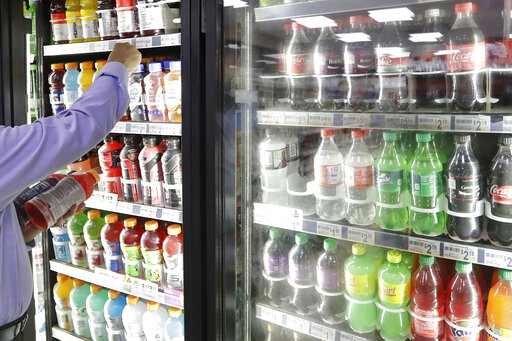COLUMBUS, Ohio (WCMH) – Consumption of sugary and artificially sweetened beverages may be linked to an increase in atrial fibrillation, a sometimes fatal heart disease. A new study published on the American Heart Association Journal website shows an association between people who drink diet soda or sugar-free soda and an increased risk of atrial fibrillation.
“Over the course of this study, people who consumed any of these types of sweetened beverages were more likely to have atrial fibrillation, with a 10-20% chance of definitely having atrial fibrillation. “Perhaps the most important thing we worry about and hear about is the increased risk of stroke that comes with atrial fibrillation,” said Dr. Blair Suter, clinical assistant professor of cardiology at The Ohio State University Wexner Medical Center. Stated. “They say it’s a diet drink, but it doesn’t necessarily mean you can lose weight, right?”
The study tracked more than 200,000 people over 10 years. The data collected showed that AFib is increased in people who consistently consume sugary and artificially sweetened beverages.
Souter said the study is certainly thought-provoking, but not “alarming.”
“I wouldn't say it's alarming, but I wouldn't say it's something that, even for me, gets people's attention,” he said. “It really makes me think about what kind of stuff I'm putting in my body. It's definitely something that gets my attention and makes me think, even if it's not an empirical study.”
“People who drank more than 2 liters of diet soda per week (one can per day, or about five and a half or six cans per week) had a higher risk of developing atrial fibrillation. One important thing to remember: “There's a correlation here, not a cause-and-effect relationship with diet soda consumption,” said Lisa Valente, registered dietitian and nutrition editor at Healthine.com.
Valente said this study was one of the first to show negative health effects from diet soda.
“There's a lot of research showing that consuming large amounts of regular soda and sugary drinks, as well as sugar, increases health risks,” she says. “That means you may have an increased risk of diabetes, obesity, heart disease, and insulin resistance. This is actually the first time we've seen a correlation in diet soda consumption.”
The study also showed a positive correlation between people drinking about 4 ounces of fruit juice each day and the development of atrial fibrillation.
Valente and Suter say the best way to support heart health isn't necessarily by cutting out soda or diet soda from your diet, but by getting 30 minutes of exercise five times a week and eating plenty of fruits and vegetables. agreed that it was important. A good place to start.
“There are probably benefits to increasing your water intake and decreasing your diet soda intake,” Valente says. “There are probably also benefits to choosing diet soda over regular soda to reduce your intake of added sugars. Start small. So think of one change you can make. And… For some people, the change will be going from sugary soda to diet soda. For others, it might mean adding more fruit to breakfast or making sure to have vegetables at dinner. not.”
When it comes to regular sugary sodas like Coca-Cola Classic, Pepsi, Dr. Pepper and Mountain Dew, Valente says “diet” or “sugar-free” versions are still a better choice.
“If your once-a-day intake seems to be going way back, it may be time to start thinking about limiting it, especially if you have other dietary risk factors for heart disease or atrial fibrillation, such as high blood pressure or diabetes. “In comparison, diet soda would be a better choice,” she said.
Suter and Valente believe there's still a lot we don't know about the health effects of diet soda and sugar-free drinks. This study could be the first in a series of studies to examine whether there is a direct causal link between artificially sweetened beverages and heart disease.
“There's also a lot of research showing that there are no negative health effects from consuming diet drinks. So this is exactly what this study makes us think we need to learn more about,” Valente said. Told.


